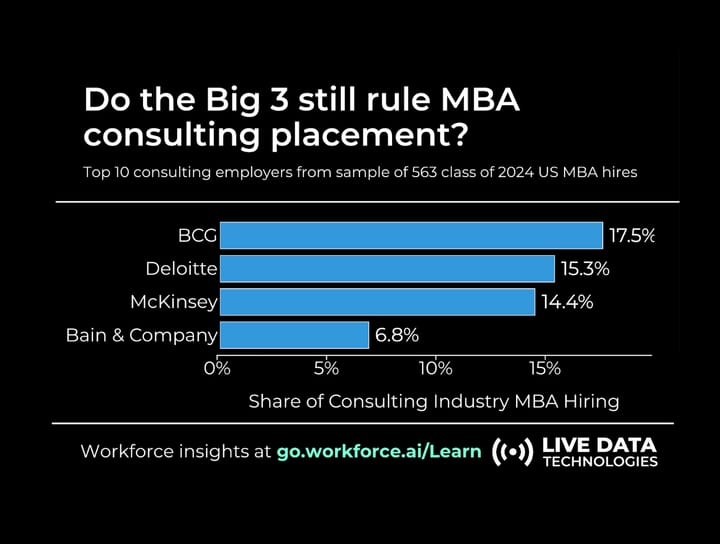The Real MBA Job Market: What 4,200 Graduates Actually Did After School

Let’s talk about a commonly-held belief about MBA recruiting: most people think that MBAs funnel straight into McKinsey, Goldman, or Google.
However, the real data might surprise you.
Recently, we collaborated with Alex Hamilton of Live Data Technologies to analyze the post-MBA jobs of 4,231 MBA graduates of the class of 2024.
Here are the most impactful findings from our analysis:
Big names don’t dominate in the ways you think
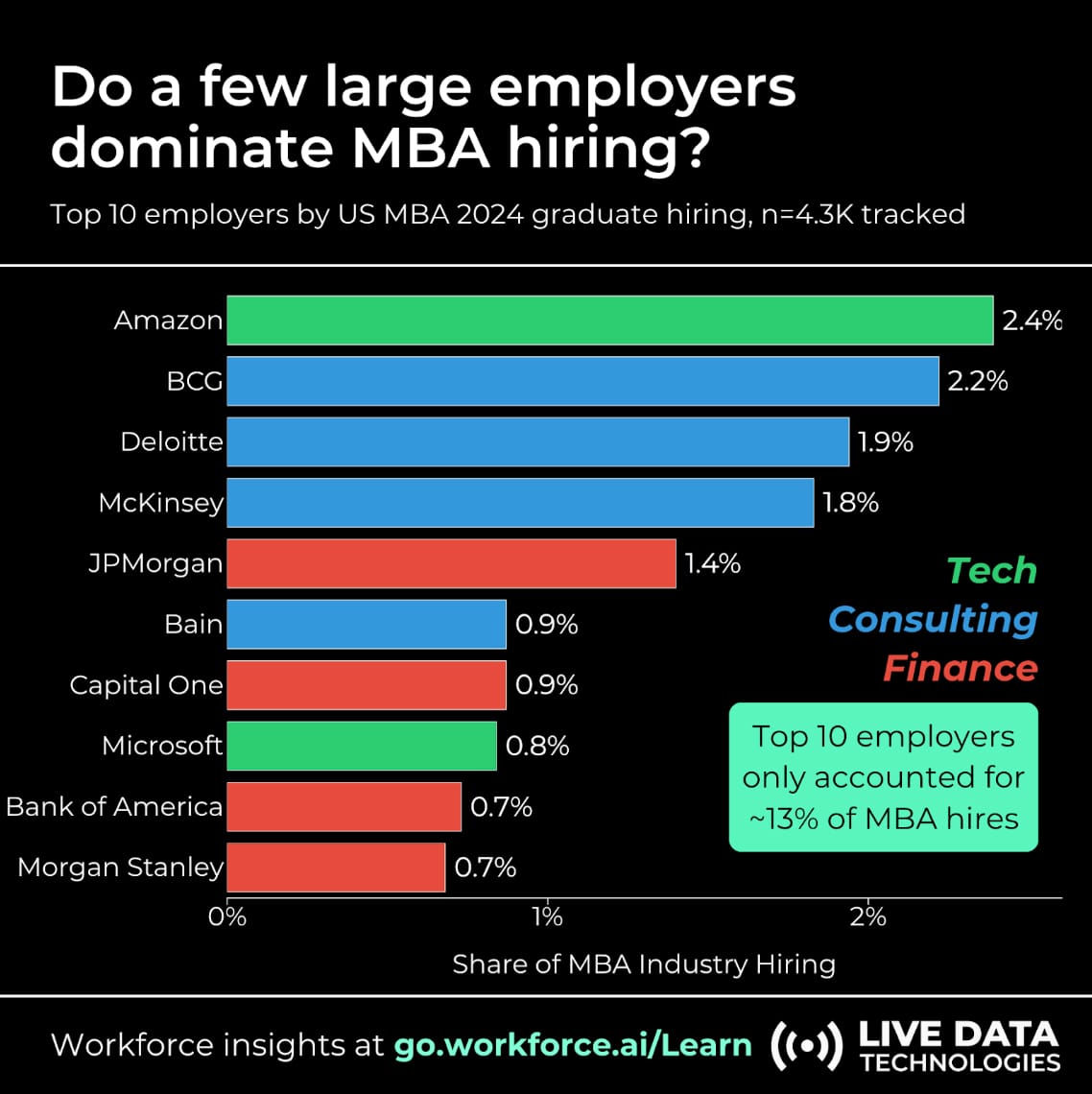
MBA recruiting pipelines don’t just feature big consulting firms and huge tech companies. While Amazon is the single largest employer in the sample, the company hired just 2.4% of MBAs. McKinsey, BCG, and Deloitte are also in the top 10… but, collectively, these top 10 companies hired just 13% of the graduating class.
That means the remaining 87% of MBA grads landed somewhere else. Specifically, 2,325 companies hired just one or two MBAs from the class of 2024. In sum, the “long tail” isn’t where some graduates end up – it’s where most graduates end up.
See our exclusive charts to learn more about hiring across tech, consulting, and finance.
Alex adds additional context: "Looking at this hiring data trends from a MBA career angle, this means students shouldn’t just aim for the big names. The real opportunity is spread across many firms, including those you may not recognize at first glance."
What this means for you: Stop obsessing over the brand names. This doesn’t mean ignore these opportunities altogether. However, there is a real opportunity with companies you’ve never heard of that may really need someone with your skill set.
School stereotypes don’t always match reality
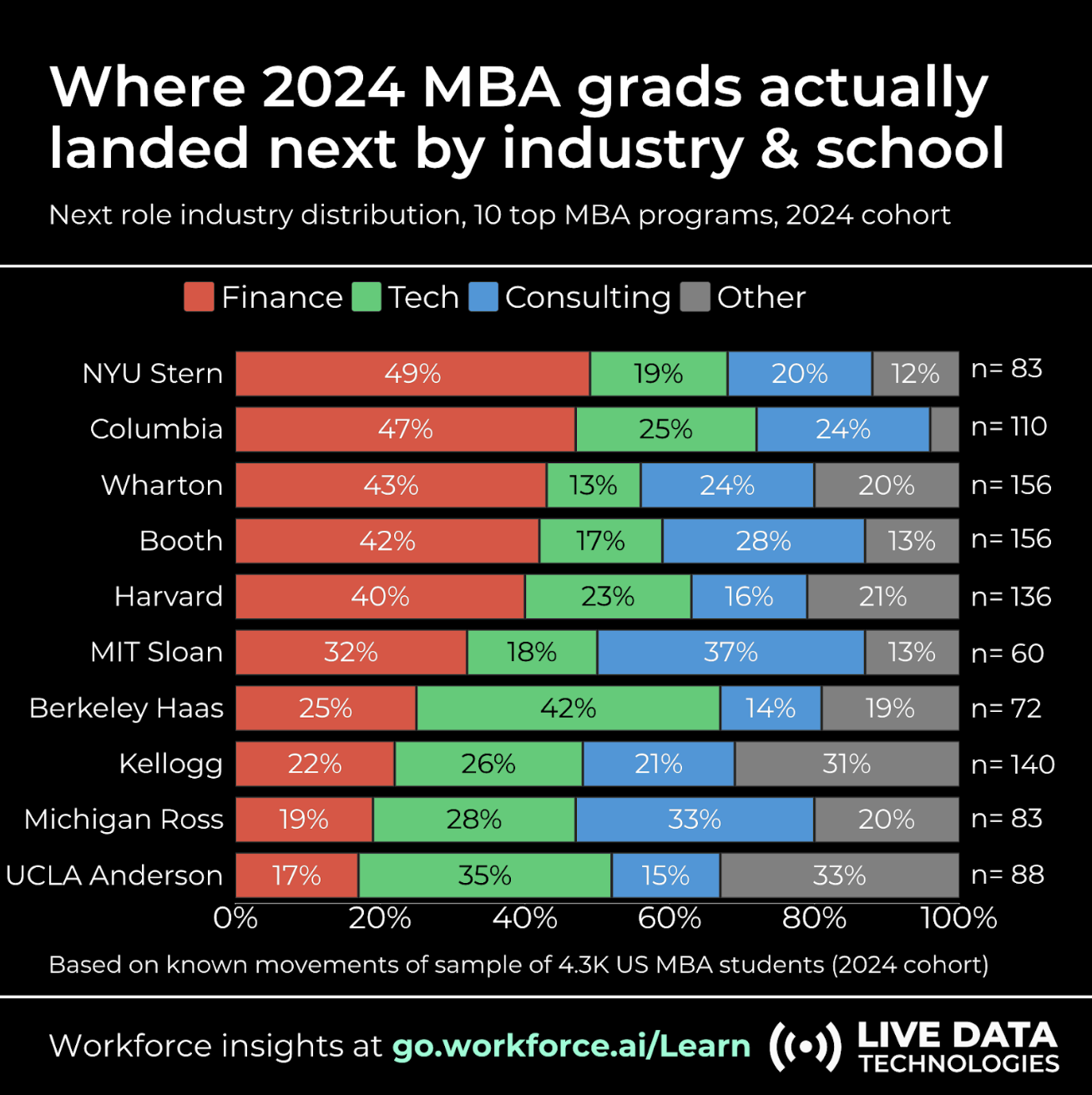
Every MBA program has a reputation and is “known” for something. For example, Wharton is known for its strengths in finance. But does that mean everyone who attends Wharton goes into finance? Absolutely not.
When you look at the school-specific data in a consolidated chart, you can easily see that there’s opportunity across industries at many of the top programs. (Take note that public sector and non-profit placement was excluded from the analysis to focus on private sector outcomes.)
Some data points may stand out. For example, Michigan Ross had strong tech placement from the 2024 cohort. On the topic of tech, it’s also a strong industry at Berkeley Haas – but it’s not the only industry where Haas grads landed jobs.
What this means for you: You don’t need to choose a program based on its perceived “brand” in your target industry. Instead, look at the placement data. You might actually find better opportunities at programs you hadn’t considered.
Your next title might not matter as much as you think
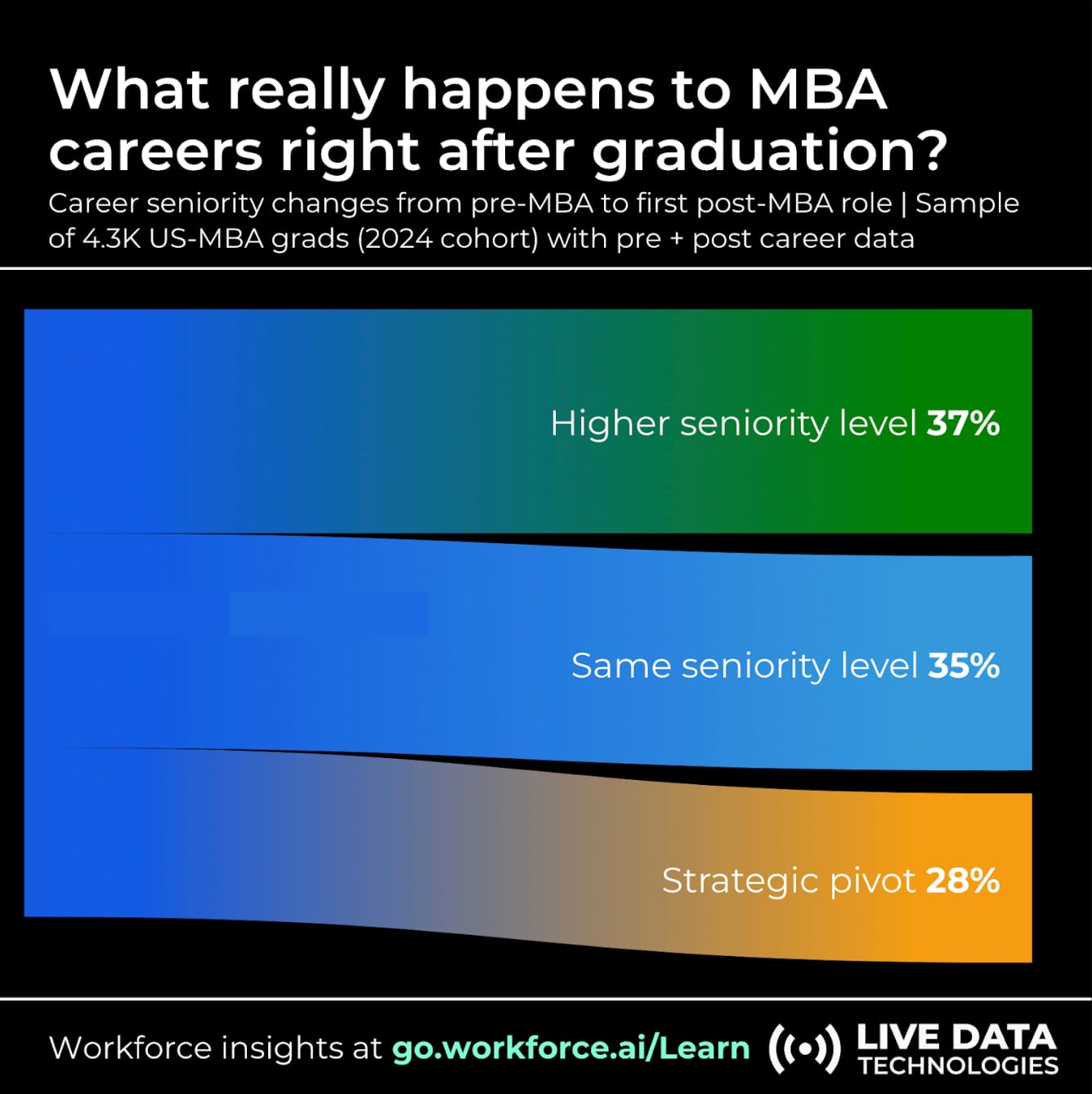
MBA candidates often pursue the degree as a way to get ahead. However, that investment isn’t always rewarded immediately with a big title.
The data tells a really interesting story. About 36% of MBAs moved up in seniority following graduation, whereas 35% stayed at the same level and 28% stepped back in title.
This may look concerning, but you also have to take into account that many MBAs are pivoting in function, industry, or both. For example, it’s common for a former consultant to take a “lesser” title in a “new” industry, like tech. Titles across industries aren’t always apples-to-apples comparisons.
However, these shifts may set grads up for stronger career progression in the long term.
Take a look at titles by the size of organization:
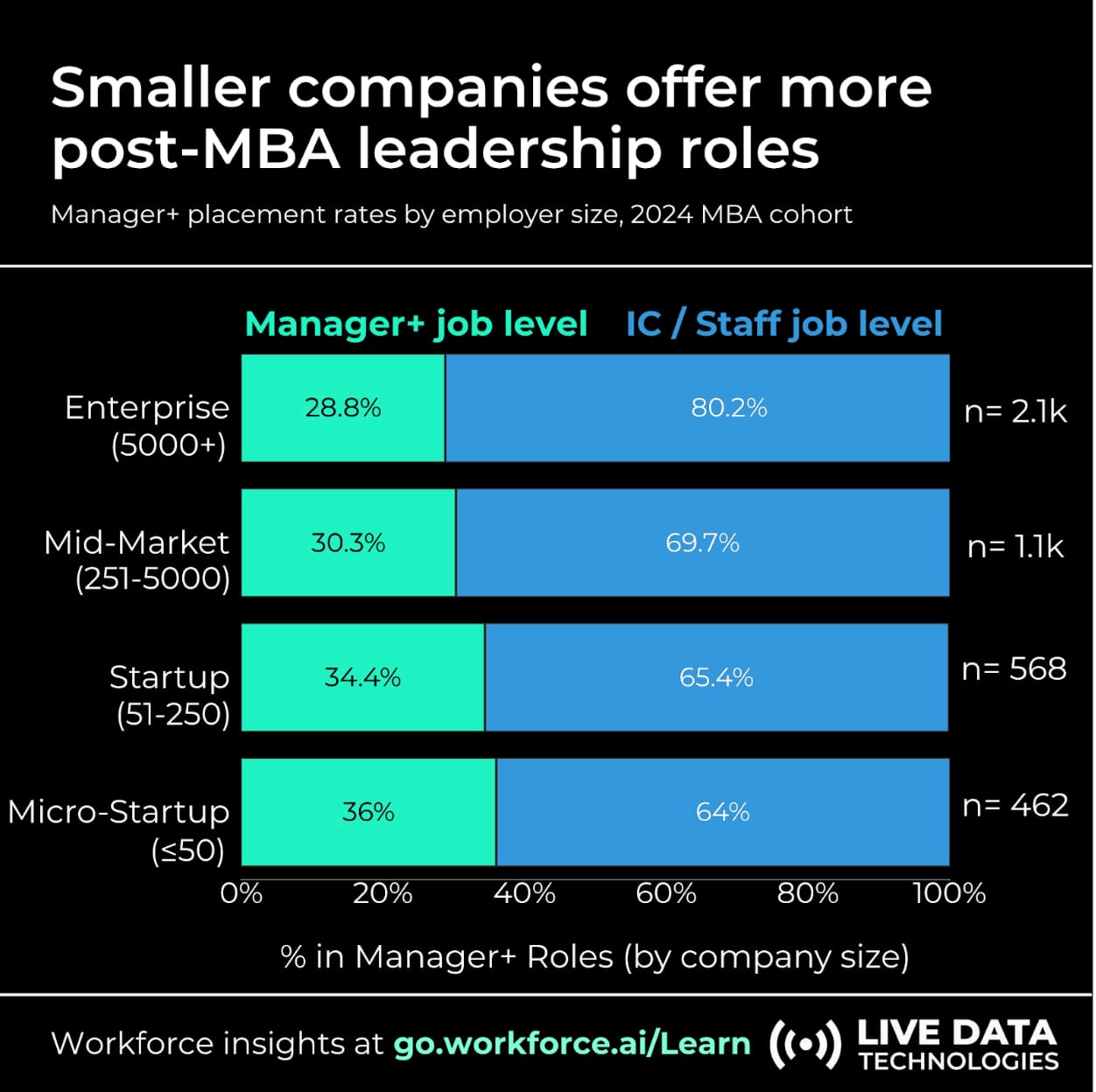
At startups, MBAs were more likely to land manager (or above) job titles. This makes sense, as larger organizations have big teams and a longer chain of command.
There’s some nuance to be aware of when looking at job level and title changes and how they can differ across differently sized companies.
A ‘Senior Manager’ at a small startup might actually be running a whole function, while someone with the same title at a Fortune 500 company could be responsible for a single team.
Alex adds, "Our workforce data shows that smaller and mid-sized firms often give MBAs more responsibility early on – even if the title looks the same or lower. In many cases, that trade-off leads to faster growth in the long run."
What this means for you: If you’re seeking opportunities where you can have a bigger title and greater scope of responsibility, look to startups.
What does it all mean?
The MBA job market isn’t just about the pipeline of opportunities to Amazon and the MBBs. In fact, the scope of opportunities has a lot more breadth than some may think.
The reality is that most graduates won’t end up at FAANG or MBB companies. However, they can and will land leadership roles across thousands of companies of all types.
An MBA’s competitive advantage in the current market isn’t chasing the obvious brands or doing the obvious things. Instead, it’s understanding where the market opportunity is, identifying the best fit companies, and matching the skills that companies need.
What this means for you: Explore opportunities beyond the top 10 companies. Thousands of companies are hiring MBAs, but most candidates will never find them because they’re focused on the big brands. The people who will win will think differently about where they can apply their skills and make an impact.
About Live Data Technologies and their data
Live Data Technologies tracks the careers of over 95M white-collar professionals in real time. Every month, we record millions of job changes—both moves between companies and internal promotions.
Our machine learning system uses publicly available information on the internet and translates job titles into consistent levels (Manager, Director, VP, etc.) across 95M+ records, so you can compare roles across industries and companies without the apples-to-oranges problem.
Click here for more information on Live Data Technology data platform and products
About this Insights Study
For this report, we analyzed 4,231 U.S. MBA graduates from the class of 2024, focusing on their first role after graduation at public and private companies.
Percentages are shown as “% of known” to ensure clarity and transparency.
This dataset gives a near real-time view of where MBAs are actually landing jobs, beyond the handful of brand-name employers usually highlighted in rankings or career brochures.
Explore Company Hiring Trends Data Yourself
Want to see where leading companies like Meta, BCG or Google are hiring MBAs right now?
👉 Try Workforce.ai free during Beta
For further insights on where companies are hiring MBA or any other white collar job profession, explore near real-time workforce insights for any company on Workforce.ai (currently in Beta available for free for the first month trial)

